EWB-UK Annual Report 2003-2004.pdf - Engineers Without Borders ...
EWB-UK Annual Report 2003-2004.pdf - Engineers Without Borders ...
EWB-UK Annual Report 2003-2004.pdf - Engineers Without Borders ...
Create successful ePaper yourself
Turn your PDF publications into a flip-book with our unique Google optimized e-Paper software.
<strong>Annual</strong> <strong>Report</strong><br />
<strong>2003</strong>/04
<strong>Annual</strong> <strong>Report</strong> produced by <strong>Engineers</strong> <strong>Without</strong> <strong>Borders</strong> <strong>UK</strong>.<br />
Editor: Tom Newby<br />
Contributions from: Mohammed Ali, Andrew Deeks, Alice<br />
Piggott, Towera Ridley, Jo Rushworth and Patricia Xavier.<br />
Copyright: 2004 <strong>Engineers</strong> <strong>Without</strong> <strong>Borders</strong> <strong>UK</strong> Ltd.<br />
<strong>Engineers</strong> <strong>Without</strong> <strong>Borders</strong> <strong>UK</strong> was founded in 2001 in<br />
Cambridge by a small group of students and is a registered<br />
charity and a company limited by guarantee.<br />
In <strong>2003</strong>/04, <strong>EWB</strong> was supported by and owes its thanks to:<br />
Kim and Beth Waterhouse, Tom Corsellis, Antonella Vitale,<br />
Joseph Ashmore, Gino Henry, Gordon Browne, Emily<br />
Browne, Prof. Richard Carter, Allan McRobie, Dr. Lis<br />
Bowman, Dr. Jane Wilson-Howarth, Himanshu Parikh, Nick<br />
Ray, Steven Hunt, Linda Cordeaux and many others.<br />
Photos: page 1, Pondicherry <strong>2003</strong>; page 4, Shelterproject<br />
2004; page 5, Clare Farm course <strong>2003</strong>; page 6, West<br />
Bengal <strong>2003</strong>; page 7 Pondicherry 2002; page 8, Ecuador<br />
2004; page 9, Nepal 2004.
contents<br />
director’s summary 2<br />
placements 3<br />
training 5<br />
branches 6<br />
ewb’s collaborations 7<br />
research 8<br />
the year ahead 9<br />
financial information 10<br />
contact details 13<br />
1
Jo Norris<br />
Legal<br />
<strong>Engineers</strong> <strong>Without</strong> <strong>Borders</strong> has had a very successful year. <strong>2003</strong>-04 saw<br />
<strong>EWB</strong> <strong>UK</strong> grow to have ten branches and 25 students working on projects<br />
around the world. During the year <strong>EWB</strong> achieved charitable status and doubled<br />
its income. The quality of <strong>EWB</strong>'s projects, and with it the impact of its<br />
work, has increased markedly due to greater experience and improved management.<br />
The longer term impact of our educational work will be even more<br />
significant.<br />
With growth and success come challenges, and <strong>EWB</strong> must in the coming<br />
years manage and meet those challenges. <strong>EWB</strong> will need to employ management<br />
staff, establish robust communications and a strong branch structure.<br />
This process has already started. I will become secretary and hand over<br />
day to day management of <strong>EWB</strong> to Andrew Lamb and Ruvan Mendis, who<br />
will be responsible for administration and projects respectively. As secretary<br />
I will take on responsibility for establishing a strong board of trustees to provide<br />
direction to the organisation and its management. The interest in <strong>EWB</strong><br />
from students has been phenomenal, as the increase in the number of<br />
branches illustrates. Expanding the roles and activities of branches, both to<br />
involve more students and relieve the load on the national management, is<br />
an important part of <strong>EWB</strong>'s strategy.<br />
One area where branches will play an important role is student training.<br />
<strong>EWB</strong>'s residential course, now well established, consistently receives very<br />
good feedback indeed and is continually over-subscribed. <strong>EWB</strong> Cardiff is<br />
already looking to expand the training we offer, and that expansion will continue.<br />
Other initiatives in training are underway and are explained later in this<br />
report.<br />
Finally I would like to say thank you to all who have given their time to <strong>EWB</strong><br />
this year. There are too many people to thank individually, but every small bit<br />
of help has been very much appreciated.<br />
Tom Newby<br />
<strong>EWB</strong> Director<br />
Ruvan Mendis<br />
Projects<br />
Andrew Deeks<br />
Training<br />
Katie Davidson<br />
Research<br />
Stephen Jones<br />
Branches<br />
Jo Rushworth<br />
Junior Treasurer<br />
Mark Miller<br />
Placements<br />
Andrew Lamb<br />
Funding<br />
director’s summary<br />
Tom Newby<br />
Director
placements<br />
This year <strong>Engineers</strong> <strong>Without</strong> <strong>Borders</strong> arranged 25 placements with seven<br />
organisations in 4 countries.<br />
Placements ranged from projects with low technical content suitable for first<br />
year engineers to design projects requiring graduates. The projects were<br />
carefully chosen to offer an opportunity for young engineers to make a valuable<br />
contribution to the project while learning a great deal about development<br />
work.<br />
<strong>EWB</strong> is currently gathering detailed feedback on this year’s placements, but<br />
first indications are that they have been a great success. These pages concentrate<br />
on two of our project locations.<br />
On this page, Mo Ali explains the work undertaken by four <strong>EWB</strong> students in<br />
Ecuador this year and last year, on three different projects.<br />
“The first of the projects is now in its second year, serving the purpose of<br />
teaching communities about the dangers of smoke inhalation, and methods<br />
of improving their health. Open wood fires are used for cooking and are<br />
responsible for 2 million deaths worldwide (WHO).<br />
Work focussed on improving the design of a mud cooker for villagers to build<br />
for themselves. The method of construction has now been taught to two different<br />
NGOs and is a part of an Appropriate Technology course at the<br />
University of Ibarra. It will also continue as part of a research project at the<br />
University of Nottingham.<br />
The second project, an investigation into cheap water filters, has resulted in<br />
the design and production of a ceramic filter that successfully eliminates bacteria<br />
and pathogens from the water supply. The project will now be continued<br />
with the University of Azuay and the local medical NGO FUNOR. The aim is<br />
to have a pilot program running by January 2005 and the first filters to be produced<br />
for July 2005. This project will run in conjunction with <strong>EWB</strong> and universities<br />
in the <strong>UK</strong>.<br />
The <strong>EWB</strong> team has put together a business plan to gain interest from local<br />
manufacturers and NGOs so that the project may run independently of <strong>EWB</strong>.<br />
The proceeds of the business created as a result will, come 2006, be reinvested<br />
into further development work in Ecuador.<br />
The final project was commissioned by the University of Cambridge in the <strong>UK</strong><br />
and MIT in the US to carry out an investigation into the "Cold Chain", the safe<br />
storage and transport of vaccines. It is estimated that currently 30 % of vaccines<br />
are useless at the point of inoculation. The project was initiated in<br />
Cambridge by engineering students who produced a design for a vaccine<br />
transporter that ensures the temperature of the vaccines is regulated during<br />
transport. The volunteers worked alongside NGOs, the Ecuadorian Ministry of<br />
Health, The World Health Organisation, Unitied Nations and the Pan-<br />
American Health Organisation, gaining invaluable experience in the world of<br />
development.<br />
The Ecuador Project has given volunteers invaluable experience in the world<br />
of development and shows that students can make a large and very positive<br />
contribution to the projects they work on. It has linked together work done in<br />
Universities with international NGOs; an invaluable aid to the universities, the<br />
students, and the NGOs involved.”<br />
3
Alice Piggott has been working with Shelter Centre in Cambridge:<br />
“There are an estimated 20 million refugees and 25 million internally displaced persons<br />
worldwide, from the Balkans, to Chad, to Afghanistan. Shelter Centre is a not for profit<br />
group, created specifically to address this need.<br />
I was given the opportunity to volunteer for Shelter Centre for 12 weeks this summer. I was<br />
working alongside six other volunteers, a culturally diverse and determined group of young<br />
people, committed to humanitarian relief work. We were set a variety of projects, including<br />
refining the frame design and the liner of a refugee hoop-tent; creating a set of training<br />
modules to be used by agencies in the field; and building up an on-line database of<br />
reference and training materials, accessible through low-bandwidth connections such as<br />
are often found in the field by development and relief workers.<br />
The impact of each of these projects is huge: the training modules will be produced in hard<br />
copy, on-line and on CD to be distributed as widely as possible. All work done by Shelter<br />
Centre is completely free of charge and free distribution is encouraged. It is hoped that<br />
these materials will help increase the efficiency and cut bureaucracy of humanitarian work<br />
abroad which often hinders agency productivity.<br />
It was fantastic to be a part of what happened at Shelter Centre this summer. I was able<br />
to use my skills as an engineer and my enthusiasm about humanitarian work to create<br />
some essential resources, and make a significant contribution to the development of a<br />
new generation of refugee tent. I have been inspired to look into development work more<br />
seriously as a career path, especially now that I am aware of the broad variety of positions<br />
in which my skills as an engineer could be invaluable.”<br />
More details on these and all of <strong>EWB</strong>’s other projects can be found on the <strong>EWB</strong> website<br />
at www.ewb-uk.org.<br />
placements<br />
4
This year saw the completion of three <strong>EWB</strong> training events, a water pump training day<br />
held in collaboration with Cranfield University and two development/disaster relief courses<br />
held in collaboration with the RedR Cambridge group at Clare farm, Dullingham,<br />
Suffolk.<br />
The Cranfield course was organised by the <strong>EWB</strong> Cambridge branch, it looked at the practicalities<br />
behind water pump design and implementation.<br />
The Clare Farm courses, run by <strong>EWB</strong> <strong>UK</strong>, studied water usage, treatment and supply;<br />
provision of shelter, and basic construction and site surveying techniques. A section on<br />
health education and personal health while abroad were also fitted into the packed weekends,<br />
as well as the opportunity for students to meet experienced professional development<br />
and relief workers.<br />
To encourage and enable participation all courses are subsidised, though a small financial<br />
contribution is required from all participants. The Cranfield course was subsidised from<br />
<strong>EWB</strong> Cambridge funds. The Clare Farm course was subsididsed by RedR Cambridge<br />
funds, obtained in co-operation with <strong>EWB</strong> from the Active Community Fund of Cambridge<br />
University.<br />
It is proposed to run further Clare Farm courses in the forthcoming year. The development<br />
of new training courses, covering different areas of development, is being pursued in cooperation<br />
with <strong>EWB</strong>’s branches. For example, <strong>EWB</strong> Imperial College is looking into running<br />
a training course covering issues related to energy in development in the next year.<br />
<strong>EWB</strong> Cardiff has also arranged a residential course at the Centre for Alternative<br />
Technology in Wales.<br />
Finally, Andrew Deeks, who has been responsible for <strong>EWB</strong>’s training for two years, will be<br />
handing over to Susan Long next year. Andrew will however still be involved and will be<br />
available to offer his invaluable help and advice.<br />
5<br />
training
anches<br />
6<br />
The number of <strong>EWB</strong>’s branches increased considerably this year, rising to ten either<br />
already established or starting in the next academic year. <strong>EWB</strong> now has branches at<br />
Bristol, Cambridge, Cardiff, Imperial College, Liverpool, Nottingham, Oxford, Sheffield,<br />
Southampton and Warwick. Branches play a vital role in reaching students and furthering<br />
the work of <strong>Engineers</strong> <strong>Without</strong> <strong>Borders</strong>. Patricia Xavier is from <strong>EWB</strong>’s new branch in<br />
Cardiff:<br />
“As one of <strong>EWB</strong>'s youngest branches (only officially gaining societal status in August this<br />
year), <strong>EWB</strong> Cardiff is still very much finding it's feet. However after a tiring summer raising<br />
local awareness and finding funding and support, the groundwork has been laid for<br />
what will hopefully be a successful inaugural year.<br />
Cardiff University itself has a large engineering department, and interest has been strong<br />
from all in getting involved. There are many engineers who care about third world development<br />
and who feel a deep sense of injustice when faced with statistics such as millions<br />
of the world population being without access to safe water.<br />
In the coming academic year, Cardiff will promote the placements to students in Wales,<br />
and seek new placements for the future. Seminars are also planned, ranging from talks<br />
from RedR and WaterAid engineers to a Cardiff student who has spent the summer on<br />
placement in India. The aim is to raise awareness about the issues faced by engineers<br />
when dealing with development abroad. Employees at several local companies have also<br />
expressed an interest in attending the talks. Fundraising for <strong>EWB</strong> is also on the agenda<br />
and a specific group to tackle this will be formed when term starts. A residential course at<br />
the Centre for Alternative Technology in Mycllynlleth (www.cat.org.uk) is planned for<br />
February.<br />
<strong>EWB</strong> Cardiff hopes to bring together and provide a good social forum for those linked by<br />
a common interest in development to share their thoughts and experiences.”
7<br />
ewb’s collaborations<br />
<strong>Engineers</strong> <strong>Without</strong> <strong>Borders</strong> is not an operational charity and does not run its own projects.<br />
The success of its work is therefore measured in the success of the projects it supports.<br />
<strong>EWB</strong> aims to promote good development work by supplying its partner organisations with<br />
students and graduates with the skills they require.<br />
In the past year <strong>EWB</strong> has worked directly with the following people and organisations on<br />
projects, training and research:<br />
Aidworld<br />
CSE India<br />
ENGhana<br />
Himalayan Lighting Foundation<br />
PAHO<br />
ORSED<br />
Shelter Project<br />
Women in Action Council<br />
CARE international branches<br />
Design that Matters<br />
FUNOR<br />
Himanshu Parikh<br />
Pastoral Social<br />
RedR Cambridge<br />
United Nations<br />
World Health Organisation<br />
<strong>EWB</strong>’s partnerships are very important and a great deal of work goes into making them<br />
successful. In the past year <strong>EWB</strong> has hosted talks by speakers from Save The Children,<br />
Registered <strong>Engineers</strong> for Disaster Relief, Oxfam, Buro Happold and others. In addition to<br />
those listed above, <strong>EWB</strong> has links with a number of other organisations and many new<br />
collaborations are in the pipeline.<br />
<strong>EWB</strong>’s collaborations are not only with other charities. In the past year projects have been<br />
run in conjunction with a number of universities around the world, including West Bengal<br />
Engineering College in India, the University of Azuay and the University of Ibarra in<br />
Ecuador, Tribhuvan University in Nepal and MIT in the US. Partnerships with overseas<br />
universities are successful at improving capacity in the developing world directly, and<br />
<strong>EWB</strong> will pursue more such projects in the coming year.
esearch<br />
8<br />
<strong>EWB</strong> works very closely with faculties at the universities at which it has branches. This has<br />
so far been through a series of presentations from professionals in the field and by supporting<br />
development-based university research projects. The talks have given students of<br />
all levels an opportunity to gain from the experience of others ranging from Oxfam engineers<br />
to emergency engineers from Save the Children. The idea is to present ideas to<br />
young engineers as early as possible so that they are exposed to up-to-date development<br />
work. Our links with Shelter Project and ITDG have also given students the opportunity to<br />
do development related research projects within university courses, such as Katie<br />
Davidson’s work with ITDG on low cost wind turbines. This year <strong>EWB</strong> has started further<br />
research projects concerning the final stage manufacture of a water filter at the University<br />
of Cambridge and the investigation of thermal flow in clay ovens at the University of<br />
Nottingham.<br />
The experience gained over the last three years will allow <strong>EWB</strong> to further expand the area<br />
of research in several of its branches, in addition to continuing with the seminars given to<br />
students. <strong>EWB</strong> intends to have a system of support present in each university including<br />
tutors and professors who will supervise student projects. This network will be linked with<br />
a portfolio of potential projects that students may choose. The international network of<br />
NGOs <strong>EWB</strong> supports means it is accumulating projects from all engineering fields, ranging<br />
from medical to electronic engineering.<br />
In 2004-05 research projects will allow students to study current problems in the developing<br />
world, giving them experience in the areas they are interested in as well as contributing<br />
to the knowledge available in the development sector. <strong>EWB</strong> aims to integrate this<br />
research into the overseas placements so that even more success can be gained from the<br />
time spent abroad; putting <strong>EWB</strong> in a unique place to link both work done in this country<br />
specifically for the development world, to actual overseas projects.
9<br />
the year ahead<br />
The 2004-05 academic is year is a very important one for <strong>EWB</strong>. With the large growth of<br />
the organisation in the last year it is clear that <strong>EWB</strong> will soon need full-time staff. To manage<br />
the large step this represents, and to ensure good governance, it is necessary to build<br />
a strong Board of Trustees.<br />
In order to manage these steps, <strong>EWB</strong>’s executive will also be seeing some changes. Tom<br />
Newby will become Secretary and will oversee the building of the Board of Trustees and<br />
with the Trustees will arrange the appointment of a full-time administrator. Andrew Lamb<br />
and Ruvan Mendis, with their now extensive experience of senior management of <strong>EWB</strong>,<br />
will take over as directors.<br />
In addition to the changes above, Mohammed Ali, the organiser and leader of <strong>EWB</strong>’s<br />
Ecuador projects and last year the president of <strong>EWB</strong> Cambridge will be taking over the<br />
charge of <strong>EWB</strong>’s research efforts. This year’s projects, and increased interest in <strong>EWB</strong>,<br />
have highlighted a number of fields in which <strong>EWB</strong> can arrange useful research, and making<br />
these projects a success will be a priority in the next year.<br />
Finally, with the increase in the number of branches, it is important that the resources and<br />
opportunities they represent are exploited. The relationship between <strong>EWB</strong> <strong>UK</strong> and its<br />
branches must become strong and productive. Branches will be used to increase fundraising<br />
efforts, provide support in managing placements and to run training courses, in addition<br />
to the established roles of raising awareness and working with their respective institutions.<br />
<strong>EWB</strong> is in a very strong position, and with its management and the large numbers of very<br />
able and enthusiastic students joining the organisation, is very well placed to continue the<br />
growth and success it has seen so far.
alance statement<br />
Year ending 31 st<br />
August 2004 (1)<br />
Year ending 31 st<br />
August <strong>2003</strong> (1)<br />
Fixed Assets 0.00 0.00<br />
Current Assets<br />
Debtors 2,580,00 0.00<br />
Cash in Bank 7,112.59 6,664.52<br />
Current Liabilities<br />
Creditors (due within 1 year) (4,970.00) 0.00<br />
Net Current Assets 4,722.59 6,664.52<br />
Net Assets 4,722.59 6,664.52<br />
non-charitable<br />
expenditure<br />
6%<br />
placement<br />
grants<br />
63%<br />
project costs<br />
16%<br />
charitable<br />
expenditure<br />
94%<br />
ewb expenditure<br />
moneys on<br />
behalf of<br />
others<br />
15%<br />
branch start-up<br />
grants<br />
2%<br />
charitable expenditure<br />
bursaries<br />
1%<br />
charitable<br />
expenses<br />
3%<br />
non-charitable<br />
placement<br />
expenses<br />
23%<br />
fundraising and<br />
publicity<br />
8%<br />
miscellaneous<br />
expenses<br />
13%<br />
interview<br />
expenses<br />
17%<br />
conferences &<br />
meetings<br />
29%<br />
staff training<br />
10%<br />
non-charitable expenditure<br />
10
statement of financial activities<br />
Year ending 31st<br />
August 2004 (1)<br />
Year ending 31st<br />
August <strong>2003</strong> (1)<br />
In Kind Cash In Kind Cash<br />
Incoming Resources:<br />
Corporate donations 17,500.00 4250.00<br />
Individual donations 461.05 50.00<br />
Grants 5,000.00 5200.00<br />
Interest 35.47 4.35<br />
Moneys administered on behalf of<br />
others (2) 1,600.00 0.00<br />
Legal Advice 5,000.00<br />
Design & Printing 200.00 250.00<br />
A. Total Incoming Resources 200.00 24,596.52 5,250.00 9,504.35<br />
Resources Expended:<br />
Activities to Further Charity’s Objects<br />
Placement Grants 17,225.00 7350.00<br />
Project costs 4,390.46 1561.39<br />
Bursaries 300.00 750.00<br />
Charitable expenses 815.00 20.00<br />
Start-up Grants to Branches 600.00 200.00<br />
Moneys administered on behalf of<br />
4180.00<br />
others (2)<br />
Total charitable expenditure 27,510.46 9881.39<br />
Costs of generating funds<br />
Fundraising and Publicity 124.48 33.15<br />
Management and administration:<br />
Miscellaneous Expenses 202.41 97.33<br />
Staff Training 153.40 0.00<br />
Conferences & Meetings 468.74 0.00<br />
Interview Expenses 281.20 0.00<br />
Non-charitable Placement Expenses 377.76 0.00<br />
Legal Expenses & Printing 200.00 5,250.00<br />
Total non-charitable expenditure 1,607.99 130.48<br />
B. Total Resources Expended 200.00 29,118.45 5,250.00 10,011.87<br />
C. Net Incoming Resources (A-B) -1,941.93 -507.52<br />
D. Funds at Beginning of year 6,664.52 7,172.04<br />
Funds at End of Year (C+D) 4,722.59 6,664.52<br />
Notes:<br />
(1) <strong>EWB</strong>’s financial reference date has altered<br />
from last year, from 31 st December to 31 st August.<br />
All data here is from the same period, but due to<br />
the change in reference date is unsuitable for<br />
direct comparison.<br />
(2) Moneys administered on behalf of others refer to<br />
financial transactions undertaken by <strong>EWB</strong> for Shelter<br />
Centre and its volunteers<br />
11
(£1000s)<br />
30<br />
25<br />
20<br />
15<br />
10<br />
Corporate<br />
Grants<br />
Other<br />
Total<br />
donors & income<br />
income history<br />
5<br />
0<br />
2001 2002 <strong>2003</strong> 2004<br />
Year<br />
03/04 corporate income 03/04 income<br />
Buro Happold<br />
11%<br />
Gifford &<br />
Partners<br />
14%<br />
Mott<br />
MacDonald<br />
14%<br />
Binnie Black &<br />
Veatch<br />
3%<br />
Anglo American<br />
58%<br />
moneys<br />
administered<br />
on behalf of<br />
others<br />
15%<br />
corporate<br />
donations<br />
65%<br />
interest<br />
0%<br />
individual<br />
donations<br />
2%<br />
ACF grants<br />
18%<br />
Buro Happold, Gifford and Black & Veatch have joined Anglo American, Mott<br />
MacDonald and HEFCE's Active Community Fund as our sponsors in the<br />
last year. The support we received from these groups enabled us to meet<br />
the fundraising target of £25,000, to offer 25 placements, to open new<br />
branches and to explore some new opportunities while remaining committed<br />
to our existing activities. Obtaining charitable status in February was a huge<br />
boost to our profile and is an important factor in our fundraising strategy.<br />
<strong>EWB</strong> fundraising has benefited from outside advice from professional<br />
fundraisers and from training provided by the Corporate Liaison Office in<br />
Cambridge. Our approach has been commended and useful contributions<br />
have been taken on board, along with many new ideas. Mo Ali, Charlie<br />
Hogg, Kimberley Roach and Will Carroll have been fundraising for <strong>EWB</strong><br />
under the direction of Andrew Lamb, and in the coming year the branches<br />
will also take a more active role in fundraising. The role of the director of<br />
funding has changed over the course of the year to that of supporting<br />
fundraisers rather than single-handedly conducting fundraising for the whole<br />
organisation. This improved approach and larger team should allow much<br />
more money to be raised whilst maintaining the highest professional<br />
standards.<br />
12
contact details<br />
Head Office & Cambridge Branch:<br />
<strong>Engineers</strong> <strong>Without</strong> <strong>Borders</strong> <strong>UK</strong><br />
29 Trumpington Street<br />
Cambridge<br />
CB2 1TA<br />
enquiries@ewb-uk.org<br />
Bristol Branch:<br />
<strong>EWB</strong> Bristol<br />
University of Bristol Union<br />
Queens Road<br />
Clifton<br />
Bristol<br />
BS8 1LN<br />
bristol@ewb-uk.org<br />
Liverpool Branch:<br />
<strong>EWB</strong> Liverpool<br />
Department of Electrical &<br />
Electronics Engineering<br />
University of Liverpool<br />
Brownlow Hill<br />
L69 3GJ<br />
liverpool@ewb-uk.org<br />
Imperial College Branch:<br />
imperial@ewb-uk.org<br />
Oxford Branch:<br />
oxford@ewb-uk.org<br />
Southampton Branch:<br />
southampton@ewb-uk.org<br />
Cardiff Branch:<br />
cardiff@ewb-uk.org<br />
Sheffield Branch:<br />
sheffield@ewb-uk.org<br />
Nottingham Branch:<br />
nottingham@ewb-uk.org<br />
Warwick Branch:<br />
warwick@ewb-uk.org<br />
13
<strong>Engineers</strong> <strong>Without</strong> <strong>Borders</strong><br />
29 Trumpington Street<br />
Cambridge<br />
CB2 1TA<br />
United Kingdom<br />
Registered Charity no. 1101849<br />
Limited Company no. 4856607<br />
www.ewb-uk.org<br />
enquiries@ewb-uk.org


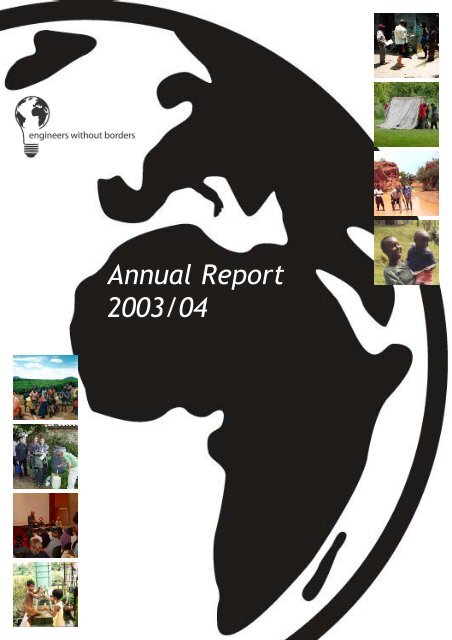
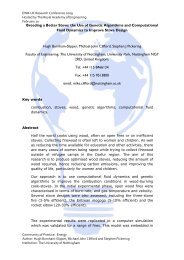

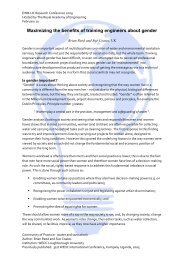
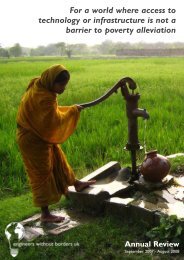
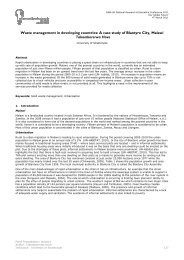
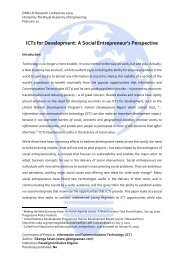
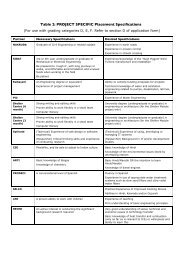

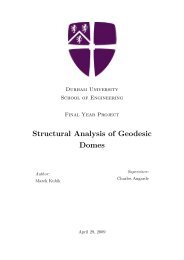
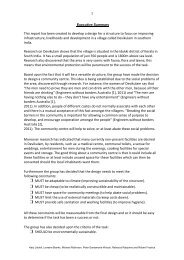


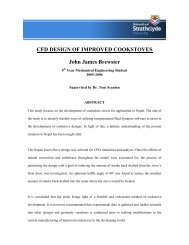
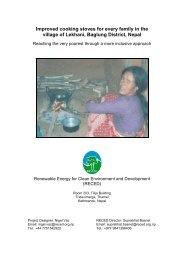
![Ethical Fundraising Guidance[1].pdf - Engineers Without Borders UK](https://img.yumpu.com/36288951/1/184x260/ethical-fundraising-guidance1pdf-engineers-without-borders-uk.jpg?quality=85)